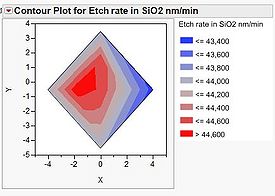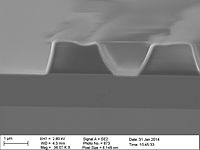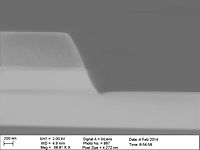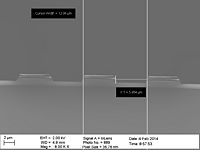Specific Process Knowledge/Etch/ICP Metal Etcher/silicon oxide: Difference between revisions
| Line 49: | Line 49: | ||
|SEM profile images | |SEM profile images | ||
| | | | ||
<gallery | <gallery widths="200px" heights="150px" perrow="3"> | ||
image:ICP_metal_resist_no_etch_s4075_2.jpg|Resist profile before etch | image:ICP_metal_resist_no_etch_s4075_2.jpg|Resist profile before etch | ||
image:ICP_metal_slow_s4075_sio2_4.jpg|Resist profiler after etch 01-02-2014. | image:ICP_metal_slow_s4075_sio2_4.jpg|Resist profiler after etch 01-02-2014. | ||
Revision as of 12:13, 17 February 2014
Slow etch of SiO2 with resist as masking material - with direct clamping
This recipe can be used for slow etching of SiO2 with resist as masking material when normal clamping is possible. Normal clamping is prefered because it give the best and most repeatable cooling of the wafer. Here are some test results presented.
| Parameter | Resist mask |
|---|---|
| Coil Power [W] | 200 |
| Platen Power [W] | 25 |
| Platen temperature [oC] | 0 |
| CF4 flow [sccm] | 20 |
| H2 flow [sccm] | 10 |
| Pressure [mTorr] | 3 |




